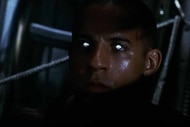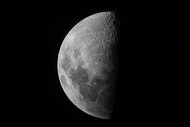Create a free profile to get unlimited access to exclusive videos, sweepstakes, and more!
Duncan Jones made Moon because he had felt sad and aimless. It changed his life.

The lifespans of three Sam Bells have come and gone since the initial release of Moon, director Duncan Jones' triumphant 2009 directorial debut.
A sci-fi comedy with dark undertones, Moon remains a showcase for actor Sam Rockwell and a case study in the brilliance that can come from understanding and even incorporating limitations. Rockwell stars as Sam Bell, an engineer working a quasi-blue collar job in an isolated space station on the far side of the moon. He knows that he's a cog in the machine of Lunar Industries, which has found a way to harvest energy on the moon; what he doesn't yet realize is that he is an eminently replaceable part.
Sam is nearing the end of a three-year contract and excited to go home, but after an accident in a lunar rover and missteps by the bosses, he discovers that he's a clone, set to expire at the conclusion of his contract. That's not so much a spoiler as it is a first act set-up, as the real attraction is watching Rockwell acting against himself in a small-scale caper set within his minuscule lunar home. He puts on two emotional tour de force performances, shifting between moods and bouncing from highs to lows far faster than the gravity around him should allow.
The movie premiered at Sundance in 2009 and went on to win Duncan an armful of awards, including a BAFTA for best debut feature by a British filmmaker and a Hugo award, among many others. To mark the 10th anniversary of its release, Sony has reissued the film in sterling 4K in a Blu-ray that was released on Tuesday. Jones, who has made three feature films since Moon, spoke with SYFY WIRE about the movie, where it came from, and what it means now.
This movie came out when I was just out of college and when I watched it then, I enjoyed it, but maybe didn't think too deeply about it. Now, after working non-stop for the last decade, the story really resonates with me — the ideas of endless repetition and being crushed by work are clear. This was your first feature but it felt like you were already trying to convey ideas like that.
I'm old, and it was absolutely allegorical for two separate things. One was about long-distance relationships and just the frustrations and difficulties of trying to maintain that communication with someone who's on the other side of the world, which is what I'd been going through when I was writing it. And then the second one was graduate school. I went to college in the Midwest, and then I did not know what I wanted to do with my life, so I actually followed my girlfriend at the time, who went off to graduate school in Nashville, Tennessee. And I ended up at Vanderbilt in a graduate program in philosophy down there. And did three years of graduate school, hating it, absolutely hating it, not wanting to be there.
And realizing after three years that I had just wasted three years of my life doing something that I did not want to do. So for me, all of that stuff, long-distance relationships and wasting years of your life was something that absolutely was a very personal connection that informed what would become the script of Moon.
How many years were you working on the script before this thing actually got made?
Oh, it was crazy fast. I had gone to Sam Rockwell with the script for Mute, which was the film that we ended up making at Netflix, but many, many years later. And I wanted him to do that film. He loved the script and wanted to work with me, but wanted to play a different character. I wanted to try to convince him to play the character I wanted him to play. And it didn't work out, but we got on very well.
So it was actually after that meeting that I started writing Moon, because it was not even a twinkle in my eye until that meeting with Sam Rockwell. Nine months after having had that meeting with Sam, we had the finished script for Moon, and we were basically shooting it three months after that. So within one year of having no script, we were shooting Moon.
How were you able to churn it out so fast? It takes some people — myself included — years to write anything worthwhile.
It was a little bit of one of those lightning in a bottle things, where the conversation with Sam was very explicit about what kind of film we wanted to make. He wanted to play a blue-collar working guy. We were both in love with these old science fiction films from the '70s and the early '80s. So we knew that was the kind of grittiness and reality of the film that we wanted to make. I had these very strong social feelings because of my own personal life that I wanted to channel into something.
The ingredients were all there on a creative level, and then on a very practical production level, [it came from] discussing things with Stuart Fenegan, my producer. It was like, "Okay, these are the limitations we have. We can probably raise this much money. We want to keep our cast as small as possible. We want to shoot at Shepperton Studios," which is the studio that I'd used for commercials and music videos before. We knew some people there, we knew we could get some favors. So there were all of these ingredients, and it was like, "Okay, this is the puzzle. Solve the puzzle." And writing Moon was basically, "How do I incorporate all of these things?" and that was the puzzle that needed to be solved.
So you've got the long-distance thing down, the out of place element is represented here. Where did the idea for clones come from?
It was two-fold. There's the practical thing of, what can I offer to Sam Rockwell as an acting challenge that's going to really engage him and get him interested? And the idea of him getting to perform with himself, that would absolutely target any actor's ego. You're meant to be the star in the whole thing, you're the whole cast, you get to play all the parts.
And then on a personal level, as a philosophy student, I found it really interesting that over the course of a person's life, they change and are different people. Going back to my graduate school days, the person I was before those three years of graduate school was very different than the person I was after those three years. You go through these periods of your life and you become different people. What if all of those versions of yourself ever had the chance to meet each other? Would they like each other, or would they drive each other crazy because of the differences? And that was the meat of that idea.
So how did you come to those two different versions of Sam?
One of the really sensible spends of money that we had on the film was Stuart, the producer, giving me a week of rehearsal time with Sam Rockwell and Sam's acting buddy, Yul Vazquez. And the three of us basically just workshopped that script to death over the course of that week and really tried to break down, "Okay, what is three years of isolation, whether it's three years of prison, or three years of graduate school Nashville, Tennessee?"
What does three years do to you when you are not around other people, and you've had a chance to self-reflect and change and grow as a person and recognize your own faults? How do you react to seeing or meeting the old version of yourself? Are you disgusted by what you used to be? Are you frustrated that, that version of you doesn't get what's wrong with them?
There are immediate opportunities for conflict when someone who's learned something has a chance to try and communicate or talk to someone who has not yet had made that change. It's almost like the older brother, who's like, "No, dude, you don't want to go drinking and drive your car. It's a stupid thing to do. Don't do that." And then there's the younger version that's like, "I can do anything I want. I'll live forever." You want to see those two different characters and how they react to each other.
The first Sam clone, the older brother here, is actually more chill; I'd be pretty pissed if I'd discovered that truth.
I think he's a little bit more zen, and I think he's exhausted as well. I think he's starting to break down. He's starting to realize that everything's been a bit of a façade that's been pulled over him. The younger one still has the energy and the anger to say, "This is not fair. I'm going to fix this." Whereas the older one's like, "Well, I guess that's the way things are." And has given up a little bit, but he's still emotional about it. It still breaks him, but he just doesn't have the energy to fight it anymore, whereas the younger one has this new information that he never would have had if it hadn't been for the older one there to show him.
This was ten years ago, when you didn't have face replacement technology. So how did you have Sam acting against himself?
Because we were on such a limited budget, it really was about choosing our moments. There are basically three and half different ways of doing that effect. One of them is really simple: You keep the two Sams separated from each other, and then you keep the camera static, and then you just film one side of it. And then you put a split between the two of them, then you film the other side of it. And we used that a number of times.
Then the next level up in complexity is where you have the camera moving, but again, you don't actually have them physically interact with each other. That's more expensive, it requires more time to get the effect right. So we did that slightly less often.
And then we saved the money shot version, where the camera's moving and their physically interacting for just a couple of moments in the film. And because of our budget, we knew that we're going to be spending more money on this, so let's not do it too often, but let's put it in the right place. So again, it was all about puzzle-solving and making sure that the audience never felt cheated, that we were trying to stop them from seeing that kind of interaction, make sure that they got it enough times throughout the film that it felt very natural and just part of the movie.
In the end, the younger Sam goes back to Earth and blows the whistle on Lunar Industries, causing their stock to plummet. I feel like if that happened today, it'd be a scandal for a day and everyone would forget about it.
Oh, God, tell me about it. I mean, if you know anything about how much I rant and rave on Twitter, you know how I feel about all that.














